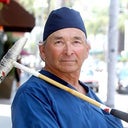Why does ectropion after or during lower blepharoplasty happen?
I'm trying to figure out why a lot of patients on Realself.com get ectropion after a lower blepharoplasty. Is it due to a surgeon not having a lot of experience doing lower blepharoplasty ? Is it due to a surgeon stretching the lower lid too much during surgery? Does ectropion even happen even if you see a Oculoplastic surgeon who only does cosmetic and reconstructive eye surgery?









